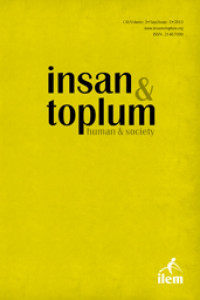Abstract
Şerif Mardin’in çevre-merkez ilişkileri yaklaşımının eleştirisinden hareketle bu çalışma, Türkiye siyasetinin söylemsel bir analizini sunmaktadır. Toplumun tam anlamıyla kendini temsil ettiği fikrine yaslanan Mardin, toplum ile toplumsal olanı eşitlemekte ve toplumun bir merkez ve bir çevreden oluştuğunu iddia etmektedir. Ernesto Laclau’nun söylemsel toplum teorisini kullanan bu çalışma, toplumun kendini tam anlamıyla temsil ettiği fikrini reddetmekte ve mevcut toplumun toplumsal alandaki tüm anlamları kapsayamayacağını iddia etmektedir. Bu sebeple, toplum sadece merkeze sahip olabilir ve toplumun kaderi de toplumsal alandaki bu merkez üzerinde kontrol tekeli kurmasına bağlıdır. Başka bir toplum-iddiasının ortaya çıkışıyla sahne alan siyasal olan, mevcut toplumsal gerçekliğin, toplumun metaforik bütünlüğünü temsil etmede olumsallığını ortaya sererek onu tehdit edebilir. Hâlde söylem teorisi perspektifine gore, siyasi analiz, toplumun ne olduğuna değil, toplumu toplum olmaktan neyin alıkoyduğuna odaklanmalıdır. Bu toplum anlayışından hareketle, bu çalışma, Kemalist “toplum”un ortaya çıkışı ve genişlemesini ve aynı zamanda farklı toplum iddialarıyla birlikte 1980’lerde kadar ki dönemde yaşadığı krizleri analiz etmeyi amaçlamaktadır.
References
- Aydın, E. (2004). Peculiarities of Turkish Revolutionary Ideology in the 1930s: The Ulku Version of Kemalism, 1933-1936. Middle Eastern Studies, 40 (5), 55-82.
- Barthes, R. (1990). S/Z, Oxford: Blackwell Pub.
- Berkes, N. (1974). Two Facets of the Kemalist Revolution. The Muslim World, 64 (4), 292-306.
- Butler, J., Laclau, E. and Zizek, S. (2000). Contingency, Hegemony, Universality. London and New York: Verson.
- Çağaptay, S. (2002). Reconfiguring the Turkish Nation in 1930s. Nationalism and Ethnic Politics, 8 (2), 67-82.
Abstract
Built on a critique of Serif Mardin’s center-periphery approach, this study offers a discursive approach to the study of Turkish politics. Resting on the belief that the society is transparent to itself, Mardin asserts that society can exhaust the social and is always composed of a center and a periphery. By deploying Ernesto Laclau’s discursive account of society, this study claims that society is not self-transparent; there is always a surplus of meaning in the social. Therefore, society consists solely of a center and its fate is tied on its success to monopolize the control of the center in the social. The advent of the political as a result of the emergence of alternative society-claim may threaten the existing social reality by revealing its contingency in representing the metaphorical totality of society. So from discourse theory perspective, political analysis should focus not on what society is but what prevents it from being. With this account of society, this study seeks to examine the rise and expansion of the Kemalist “society” as well as its dislocations owing to the emergence of other society-claims till the 1980s.
References
- Aydın, E. (2004). Peculiarities of Turkish Revolutionary Ideology in the 1930s: The Ulku Version of Kemalism, 1933-1936. Middle Eastern Studies, 40 (5), 55-82.
- Barthes, R. (1990). S/Z, Oxford: Blackwell Pub.
- Berkes, N. (1974). Two Facets of the Kemalist Revolution. The Muslim World, 64 (4), 292-306.
- Butler, J., Laclau, E. and Zizek, S. (2000). Contingency, Hegemony, Universality. London and New York: Verson.
- Çağaptay, S. (2002). Reconfiguring the Turkish Nation in 1930s. Nationalism and Ethnic Politics, 8 (2), 67-82.
Details
| Primary Language | English |
|---|---|
| Subjects | Sociology |
| Journal Section | Research Articles |
| Authors | |
| Publication Date | June 1, 2013 |
| Published in Issue | Year 2013 Volume: 3 Issue: 5 |


